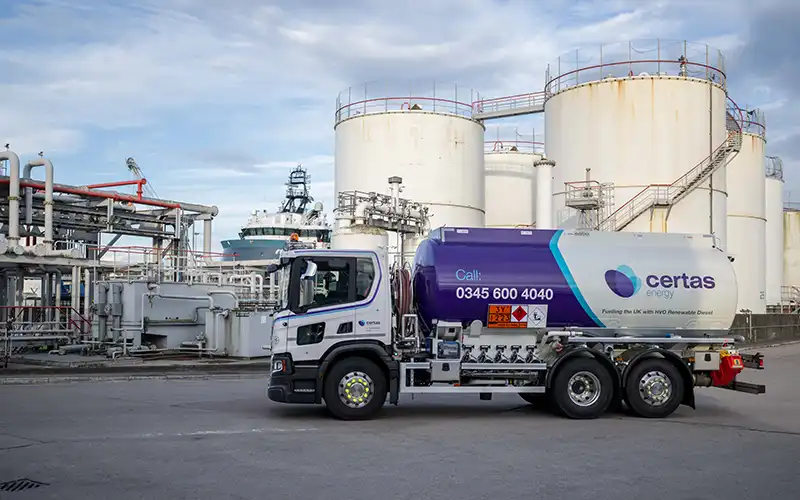As with all energy and fuel supply chains, there are potential pitfalls if you don’t carry out due diligence when choosing a supplier.
If you are thinking about HVO adoption, it is imperative to seek a transparent and trusted provider who can give full visibility of the fuel’s supply chain. This way, you can ensure your sustainability objectives are being met and be confident about your carbon reduction claims.
The HVO supplied by Certas Energy, complies with all required legislation including the EU’s RED II and the UK’s RTFO. Certas Energy procure HVO from a small number of trusted global producers, who themselves are regulated, and leverage the highest quality supply chains to ensure eligible feedstocks are procured and correctly labelled.
How is HVO made
Certas Energy HVO is produced from waste and residue derived feedstocks, HVO is a 100% biodegradable renewable diesel (DERV) that meets EN15940 standard for paraffinic fuels.
Unlike conventional diesel production, hydrogen is used to remove oxygen from the oil molecules and split them into smaller chains, making combustion easier and cleaner. The practically FAME and fossil-free* fuel can be used as a direct drop-in replacement for traditional diesel, without the need for machinery or engine modifications. It also delivers impressive and immediate results – cutting up to 90 per cent of greenhouse gas emissions in an instant – helping businesses lower their carbon footprint, without delay. HVO offers a longer shelf life, excellent low-temperature performance, higher filterability and improved combustion over some diesel alternatives. To top it off, HVO fuel is fully interchangeable with traditional diesel and can be mixed in any ratio, offering significant flexibility and allowing for a gradual, frictionless transition.
These properties combined make HVO an ideal choice for businesses that want to realise significant carbon reduction without compromising productivity or incurring capital investment costs.
Top tips for choosing a HVO supplier
- Ask if the supply is 100%, unblended HVO
- Seek out an international Sustainability & Carbon Certification (ISCC)Certified supplier
- Ask is the supplier can provide a Certificate of Analysis (CoA) or certificate of Conformity (CoC)
- Check if they are a member of Zemo Partnership and a Recognised Fuel Supplier under RAFS
- Check that the product meets the EN15940 fuel standard
- Ask about the origins of the production location and if the feedstock is certified waste
- Ask if the level of greenhouse gas intensity of the product within the expected range (>75% saving v. EN950)
- Check that a reliable and competitive supply of HVO is assured
Choosing the right HVO supplier
With so much to gain, it is easy to see why many businesses are keen to adopt HVO and kick-start their journey to lower emissions.
However, sustainability credentials can be variable from supplier to supplier.
A number of factors can determine the ethical and ecological impact of HVO sourcing, from geo-politics and deforestation to land use and type of feedstock. It is also important to be aware that the level of greenhouse gas emissions savings can vary by product, as they do not come entirely from tailpipe emissions. Savings are based on a life-cycle, well-to-wheel calculation, taking into account feedstock, production processes and transportation. Businesses need visibility of the fuel’s upstream supply chain – so that they can substantiate their downstream sustainability claims.
Recommended credentials of HVO supply chain
When it comes to partnering with a supplier, there are some key considerations for businesses.
It is imperative to seek out a HVO fuel supplier that is International Sustainability & Carbon Certification (ISCC) certified. Progressive suppliers may be members of the Zemo Partnership and share credentials and certifications via the network, such as becoming a Recognised Fuel Supplier under Zemo’s Renewable Fuels Assurance Scheme (RFAS). The Zemo Partnership is a not-for-profit, independent partnership, jointly funded by government and members, with a shared vision of accelerating transport to zero emissions.
Any reputable supplier should be able to demonstrate a fully validated and auditable supply chain, including presentation of a Proof of Sustainability certificate. As a Recognised Fuel Supplier, Certas Energy can provide its own Proof of Sustainability certificate, underwritten by Zemo, which guarantees that businesses are purchasing bulk supplies of sustainable low carbon fuels. Furthermore, our fuel’s credentials are audited by the Department for Transport (DfT) to ensure sustainability and product integrity are certified. As the level of GHG reduction can differ, it is important to check what emissions savings can be achieved through the product – a minimum of 80 per cent is recommended. Finally, it is important to ensure that your partner can provide a reliable and competitive supply of HVO, to limit any disruption to business operations.
Partner with a supplier with similar ESG goals
As a business, Certas Energy is also committed to reducing our own emissions – a classic case of “do as we do” – with 238 of our fleet already running on HVO renewable diesel and with ambitious plans to further expand across the fleet. This has saved 11,311 tonnes of Co2e in the last 12 months and delivered a reduction in emissions of 35.8% when compared with standard diesel fuel.
Fuelling the future of your business
Certas Energy HVO is ethically sourced, ecologically responsible, and exclusively manufactured from primary waste sources. We only partner with ISCC certified HVO suppliers, each one having a fully validated and auditable supply chain, so our HVO meets the highest auditable product standards possible.
Interested in integrating HVO into your energy mix? Get in touch with our experts and begin your lower emissions transition today.
Call our HVO hotline 0345 456 1800
*<1% nominal trace levels only, if not zero.
Is Certas Energy HVO Supply chain reliable
Yes, Certas Energy HVO adheres to the highest possible industry standards as set out by the ISCC. HVO remains an important short and medium-term energy solution for businesses’ transition to net zero.
Does Certas Energy HVO contain virgin palm oil?
No, the HVO supplied to customers by Certas Energy, complies with all required legislation including the EU’s RED II and the UK’s RTFO. Certas Energy procure HVO from a small number of trusted global producers, who themselves are regulated, and leverage the highest quality supply chains to ensure eligible feedstocks are procured and correctly labelled.
We will continue to work with the ISCC as the leading provider of supply chain assurance. The ISCC provides a strict framework criteria, which is compliant with legislation, and operates a robust verification process. This includes on site spot audits, satellite monitoring of high-risk sites, and plausibility checks.
What is Certas Energy HVO made from?
Our HVO is produced from waste and residue derived feedstocks, supplied by the big six global energy companies, and approved by the Renewable Transport Fuel Obligation (RTFO) scheme, which is audited by the Department for Transport (DfT).
Where does Certas Energy procure its HVO from?
We procure HVO from a small number of trusted global producers, who themselves are regulated, and leverage the highest quality supply chains to ensure eligible feedstocks are procured and correctly labelled.
Existing trade remedies and counter measures play an effective role in ‘locking out’ large sections of high-risk origin supply chains. These include steps which have caused production capacity to increase in Europe and the US, including:
- The EU’s anti-dumping duties on Chinese derived biodiesel and HVO;
- Malaysia and Indonesia restricting export licenses of used cooking oil and palm derived products until further notice;
- US removal of incentivisation of foreign imports of used cooking oil.
Can we trust the ISCC certification of waste biofuels?
Certas Energy firmly believes the ISCC, and other voluntary assurance schemes should continue to be supported – both by businesses and by governments.
Continuous improvements to supply chain assurance – such as the Union Database, due for implementation in May – will be a mandatory electronic traceability platform for all European biofuel producers, improving traceability and transparency throughout the supply chain.
Our HVO also complies with all required legislation including the EU’s RED II and the UK’s RTFO.
What is the difference between POME oil and Palm Oil?
Virgin palm oil is the highest yielding vegetable oil crop in the world, and as such produces 10-15 times as much oil per hectare than the next highest yielding vegetable crop – soy.
The waste by-product of palm processing is a palm oil mill effluent sludge which if uncollected emits methane at a rate of ~20 cubic metres per tonne of POME.
POME oil – when processed – is instead refined into a renewable fuel feedstock (albeit less than 2% of total renewable fuel feedstocks in the UK) and tends to be used in biodiesel blended into fossil diesel rather than ‘HVO100’.
Yes, Certas Energy HVO adheres to the highest possible industry standards as set out by the ISCC. HVO remains an important short and medium-term energy solution for businesses’ transition to net zero.
No, the HVO supplied to customers by Certas Energy, complies with all required legislation including the EU’s RED II and the UK’s RTFO. Certas Energy procure HVO from a small number of trusted global producers, who themselves are regulated, and leverage the highest quality supply chains to ensure eligible feedstocks are procured and correctly labelled.
We will continue to work with the ISCC as the leading provider of supply chain assurance. The ISCC provides a strict framework criteria, which is compliant with legislation, and operates a robust verification process. This includes on site spot audits, satellite monitoring of high-risk sites, and plausibility checks.
Our HVO is produced from waste and residue derived feedstocks, supplied by the big six global energy companies, and approved by the Renewable Transport Fuel Obligation (RTFO) scheme, which is audited by the Department for Transport (DfT).
We procure HVO from a small number of trusted global producers, who themselves are regulated, and leverage the highest quality supply chains to ensure eligible feedstocks are procured and correctly labelled.
Existing trade remedies and counter measures play an effective role in ‘locking out’ large sections of high-risk origin supply chains. These include steps which have caused production capacity to increase in Europe and the US, including:
- The EU’s anti-dumping duties on Chinese derived biodiesel and HVO;
- Malaysia and Indonesia restricting export licenses of used cooking oil and palm derived products until further notice;
- US removal of incentivisation of foreign imports of used cooking oil.
Certas Energy firmly believes the ISCC, and other voluntary assurance schemes should continue to be supported – both by businesses and by governments.
Continuous improvements to supply chain assurance – such as the Union Database, due for implementation in May – will be a mandatory electronic traceability platform for all European biofuel producers, improving traceability and transparency throughout the supply chain.
Our HVO also complies with all required legislation including the EU’s RED II and the UK’s RTFO.
Virgin palm oil is the highest yielding vegetable oil crop in the world, and as such produces 10-15 times as much oil per hectare than the next highest yielding vegetable crop – soy.
The waste by-product of palm processing is a palm oil mill effluent sludge which if uncollected emits methane at a rate of ~20 cubic metres per tonne of POME.
POME oil – when processed – is instead refined into a renewable fuel feedstock (albeit less than 2% of total renewable fuel feedstocks in the UK) and tends to be used in biodiesel blended into fossil diesel rather than ‘HVO100’.
TAKE CONTROL OF YOUR FLEETS FUEL
Ready to start fuelling your business' success?
Steamline your fleet operations, control costs, and experience the benefits of Certas Energy Fuel Cards. Get in touch to start saving today.




